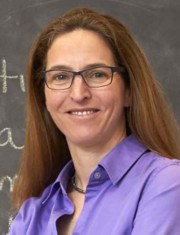Scientist profiles S-Z
SRI profiles

Senior scientist
Sunnybrook Health Sciences Centre
2075 Bayview Ave., Room S620
Toronto, ON
M4N 3M5
Administrative Assistant: Cassandra Cheng
Phone: 416-480-6100 ext. 63537
Email: cassandra.cheng@sri.utoronto.ca
Education:
- B.Sc. (Hons), 1991, mechanical engineering, Queen's University, Canada
- PhD, 1999, bioengineering, University of California-Berkeley/University of California-San Francisco, U.S.
Appointments and Affiliations:
- Senior scientist, Physical Sciences, Holland Bone and Joint Research Program (director), Sunnybrook Research Institute
- Director, orthopaedic biomechanics lab, Sunnybrook Health Sciences Centre
- Professor, department of surgery, faculty of medicine, University of Toronto
- Professor, Institute of Biomaterials and Biomedical Engineering, U of T
- Professor, Institute of Medical Sciences, U of T
Research Focus:
- Orthopaedic biomechanics
- Bioengineering
Research Summary:
Dr. Whyne's lab is focused on translational bioengineering research aimed at better understanding the biomechanics of the musculoskeletal system and developing minimally invasive technology to diagnose and treat musculoskeletal disease and injury. Using an engineering approach, her team uses experimental and numerical methods, including the following:
- in vitro and in vivo testing
- computational modeling
- image analysis
- biomechanical testing
- design and minimally invasive technology development.
Dr. Whyne's work integrates biomechanical analyses with clinical and basic science investigations of musculoskeletal injury and disease, with a final goal of translating findings into the clinic. Her work is primarily focused in the areas of skeletal metastases, spinal,lower extremity and thin bone biomechanics, image-guided surgery, and fracture fixation and healing.
Selected Publications:
See current publications list at PubMed.
Related News and Stories:
- Let’s talk (women in science): What will it take to boost participation of women in engineering and physics, where gender imbalance is notably prominent? Contributing to the conversation, for starters (SRI Magazine, 2018)
- Resounding approval: Sunnybrook Research Institute's success rate in CIHR competition soars past national average (Jan. 25, 2018)
- Back to basics: Federal agency invests in SRI scientists (June 30, 2016)
- Innovative technologies need early-stage investment: Proof-of-principle funding is important to get medical products to market (SRI Magazine, 2016)
- Poster competition turns on the heat: Summer students showcase diverse research projects (Aug. 26, 2015)
- Enmeshed in research: Undergraduate gains hands-on experience in software development for craniofacial implants (Aug. 19, 2015)
- Predicting Fracture Risk: Taking the guesswork out of radiotherapy technique (SRI Magazine, 2015)
- Field of view: Research day proclaims promise of image-guided medicine (Jan. 15, 2014)
- Making the cut: Amid fiscal challenges, SRI researchers get funded (Feb. 7, 2013)
- A brilliant combination: Pairing light and drugs to kill cancer that has spread to bone (SRI Magazine, 2010)
- Researchers to explore new treatments for fractures (July 6, 2010)
- Crowning tomorrow's medical scientists: Annual project competition highlights research talent of SRI's summer students (Aug. 26, 2009)
- What goes around comes around: Outreach brings SRI's science and technology to the classroom (Sept. 17, 2008)
- Spring up: Eleven SRI researchers are recognized by a quartet of funding bodies (June 3, 2008)
- Its own reward: CIHR recognizes a sextet of Sunnybrook scientists with its most recent funding announcement (Feb. 12, 2008)
- Model regeneration: ARTEC gives shape to tissue engineering research (Sunnybrook Research Institute Research Report, 2004–2006)
Related Links:
- Orthopaedic biomechanics laboratory
- Centre for Research in Image-Guided Therapeutics
- U of T profile, Institute of Biomaterials and Biomedical Engineering
- U of T profile, department of surgery, division of orthopaedics
- U of T spine program profile
- U of T profile, Institute of Medical Science
- Orthopaedic Research Society spotlight


